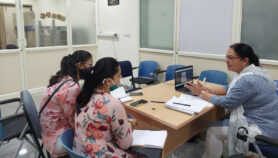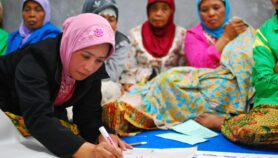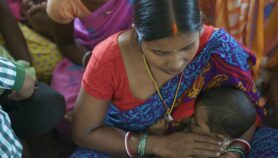23/03/22
Q&A: ‘Community support vital’ to tackle mental health

Send to a friend
The details you provide on this page will not be used to send unsolicited email, and will not be sold to a 3rd party. See privacy policy.
[NEW DELHI] When Thara Rangaswamy received the 2022 Nari Shakti Puraskar award on Women’s Day from the government of India it was recognition for her pathbreaking work in creating wider awareness about mental health disorders.
In a country with far too few psychiatrists, Rangaswamy is known for her community initiatives to combat mental illness. Every seventh Indian is affected with some form of mental health disorder but, according to the Indian Journal of Psychiatry, in 2019 there were only 9,000 psychiatrists to treat them. This means that India has 0.75 psychiatrists per 1,000 people, far below the desirable figure of three psychiatrists per 1,000 people.
A large number of patients in India remain untreated, especially in rural areas where traditional faith healing is prevalent, says Rangaswamy. People with mental health problems in the country hardly get any disability benefits and it was after much lobbying that mental illness was even included as a disability.
“The treatment for both men and women is the same. However, the way they respond to the medication may be different as side-effects tend to be different.”
Thara Rangaswamy, Schizophrenia Research Foundation
The Schizophrenia Research Foundation in Chennai, which Rangaswamy co-founded in 1984, has tracked schizophrenia patients for over 35 years and documented their journeys. Rangaswamy has also developed a tool to measure mental disability and functioning in schizophrenia.
In 2020, the Schizophrenia International Research Society honoured her with an award for outstanding clinical and community research – one of numerous honours and awards she has received.
Rangaswamy tells SciDev.Net that stigma remains a huge challenge for people with mental health disorders in India, and those who work with them.
What inspired you to take up psychiatry, particularly schizophrenia, as your field of work?
In the 1980s, most women took up obstetrics and gynaecology or paediatrics. I was not interested in either. I thought I would try working in psychiatry because I liked observing people, especially people who had no one to confide in. I found that people, especially women, had many problems but were unable to express themselves to their own families and needed professional help.
Who influenced you most in your work?
When I started work as research officer on a schizophrenia project, funded by the Indian Council of Medical Research, Sarada Menon, India’s first woman psychiatrist, was the consultant. She was also my teacher in medical school and had selected me for postgraduate studies. Her passion for rehabilitation was inspiring and she was a role model for many of us. When she founded the Schizophrenia Research Foundation in 1984 many people did not even know what schizophrenia was!

Thara Rangaswamy receives here HINDU award for excellence in 2018. Image credit: Edit Article “Q&A_ ‘Community support vital’ to tackle mental health” ‹ Asia & Pacific — WordPress.html
How did you balance your career and family life?
It is best not to take work problems home unless they are pressing in nature. Time for the family should be set aside. Thinking and worrying about work at home is often perceived by the children and other members as not prioritising the family. At times, it works the other way too when family issues affect one’s work functioning. It is best to confide in a case colleague or friend rather than keep it all bottled up.
Please explain the Madras Longitudinal Study which followed up on persons with first episode schizophrenia over 35 years.
People with schizophrenia have hallucinations, feel persecuted and slowly it becomes difficult for them to function. At times, they do not talk or talk and smile to themselves. They may not be able to continue with their jobs or studies.
The study is the longest follow-up study from this part of the world. One-third of the patients died, some by suicide. Mortality in persons with schizophrenia is quite high and we should try and address physical illnesses they may have. I also found that while women who developed schizophrenia were most often sent back to their parental homes by the husbands and in-laws, men with schizophrenia were almost always taken care of by their wives. Hospitalisation was not required in most cases. Family support and having a job were critical.
What are the community measures that you have taken to help people with mental health disabilities?
We employed measures such as improving awareness, enlisting support of local leaders, religious heads, traditional healers, teachers, certifying disability for patients so that they can benefit from welfare measures, creating job opportunities either by using existing state-run schemes or helping them get loans to start small businesses. We used mobile telepsychiatry to deliver high-quality care for schizophrenia in resource-less rural communities, which is now serving more than 1,500 patients.
How has treatment of mental health disorders and mentally ill people changed over the last 20 years?
Treatment has definitely improved. It consists of medical management and psychosocial support from the family or community. Early anti-psychotic drugs such as chlorpromazine definitely reduced hallucinations but also made the people who took them drowsy and sleep for long. Now, we have drugs that work better and do not make patients sleepy.
It is also being recognised now that psychosocial support is important. We are in a better space now, but much more needs to be done in terms of improving awareness, access to care and reducing stigma.
Do you think women are more prone to mental illnesses? Does treatment differ for men and women?
There are some studies that suggest that more women are affected by depression. The treatment for both men and women is the same. However, the way they respond to the medication may be different as side-effects tend to be different.
Some side-effects in women lead to the stopping of menstruation and they may put on weight. The kind of psychosocial support a woman receives from her support group, her family, in-laws, husband may be different from what men may receive.
If a woman gets better after some time and the community withdraws the support, she may fall right back into her old illness.
If you were asked to provide a single measure to prevent depression, what would that be?
Build resilience from a young age and develop coping strategies. Any family can be of support, whether nuclear or otherwise.
The causes of mental illnesses could be genetic, environmental, personality traits, coping abilities, chemical composition of the brain or a combination of some of these. Depression could be a symptom of an underlying condition or a condition in itself. There is no clear demarcation. Treatment and empathy with the suffering is important.
What can be done to prevent mental illness? How should others in the community deal with people who are mentally ill?
Many mental disorders cannot be prevented, especially the more severe ones. Early detection and regular treatment are key. Talking to the family to encourage treatment is important as also is education. Mental illnesses are like physical disorders but require more understanding. Avoid using stigmatising terms, isolating persons with mental illness and having misconceptions such as that they are all aggressive.
What are the main challenges in psychiatry in India?
The main challenges here are lack of awareness, lack of facilities and stigma. Therefore, people come late for treatment. Competing religious or other treatments often increase the time people take to seek medical help.
This piece was produced by SciDev.Net’s Asia & Pacific desk.















